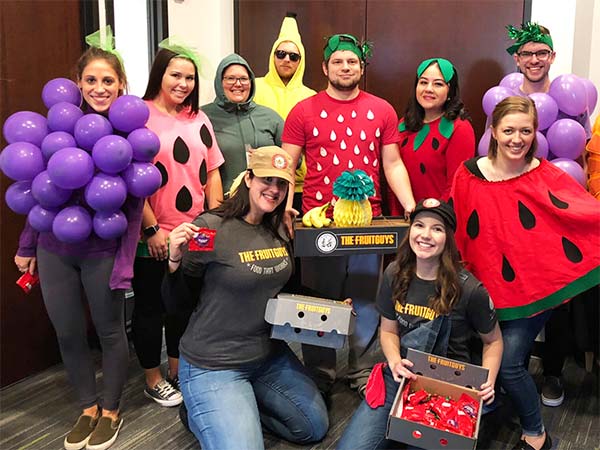Welcome to The FruitCorner!
What’s Fresh This Week?
Enter your zip code to see what’s in your seasonal mix
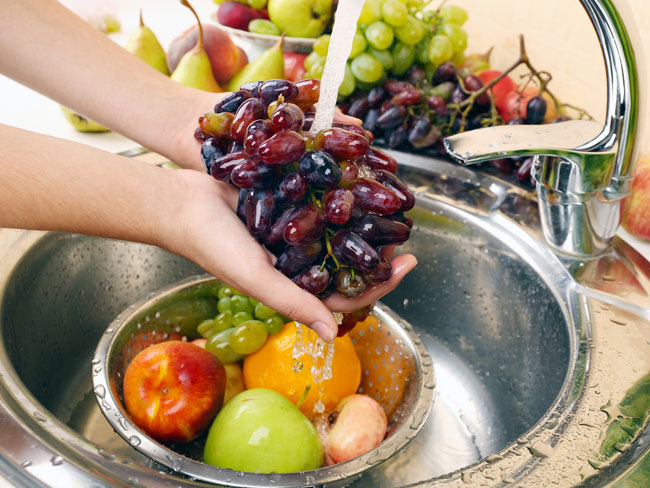
Please wash your delicious fruit and your hands before consuming. We source whenever possible from small farms in your region to bring you fruit that’s in season.
Featured Farm
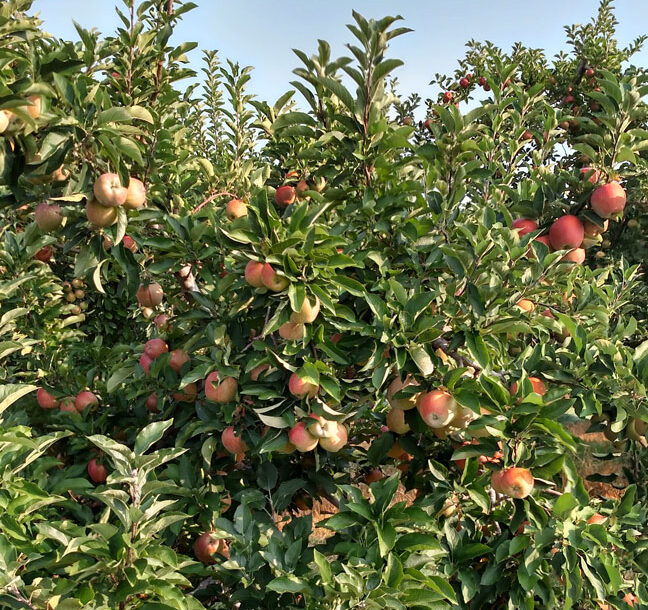

Frecon Farms & Orchards
Frecon Farms and Orchards is a 120-acre farm in Boyertown, PA that grows apples, pears, plums, peaches, nectarines, apricots, and berries for our East Coast clients. Steve Frecon and his family have been farm partners with The FruitGuys for nearly a decade.
Free Weekly Wellness Breaks

Take a Breather
Join our free Take a Breather session every Wednesday, 12:30-12:45 PST, featuring desk stretches, breathing, and guided visualizations to pause, rest, and refresh your brain, body, and spirit. Registration required.
Live Customer Service

Real People
Questions? Order Changes? Vacation holds? New account point person? Want to forward an order to a charity? Our friendly customer service team is here to help Monday through Friday, from 6 a.m.–5 p.m., PST.
Call us at 1-877-FRUIT-ME (877-378-4863) or email us at info@fruitguys.com. Real people in California respond! We require at least two business days notice for order changes.
Don’t miss an update on your deliveries— make sure your account contact information is current.
Guide to Fruit Ripening & Storage
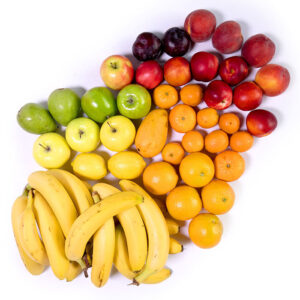 We pack your fruit at the edge of ripening to prevent any damage during delivery and to satisfy the widest range of preferences of fruit ripeness. This means that peaches, plums, kiwi, mango, pears, and other climacteric fruit (that continues to ripen once picked) may need a couple days before reaching peak ripeness. To hasten ripening: place fruit in a paper bag with a banana or apple and leave it on the counter for 24-48 hours. When it gives to gentle pressure, it is generally ripe. Berries and grapes should be refrigerated and washed just before eating. Fruit should be stored on the counter, out of direct sunlight, and washed just before consumption.
We pack your fruit at the edge of ripening to prevent any damage during delivery and to satisfy the widest range of preferences of fruit ripeness. This means that peaches, plums, kiwi, mango, pears, and other climacteric fruit (that continues to ripen once picked) may need a couple days before reaching peak ripeness. To hasten ripening: place fruit in a paper bag with a banana or apple and leave it on the counter for 24-48 hours. When it gives to gentle pressure, it is generally ripe. Berries and grapes should be refrigerated and washed just before eating. Fruit should be stored on the counter, out of direct sunlight, and washed just before consumption.
Apples
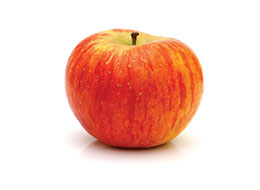 Apples should be kept in a cool space away from sunlight and heat. Depending on the variety, they will keep in a cool space for up to two weeks. When refrigerated, most apples will keep for 3–4 weeks.
Apples should be kept in a cool space away from sunlight and heat. Depending on the variety, they will keep in a cool space for up to two weeks. When refrigerated, most apples will keep for 3–4 weeks.
Apricots
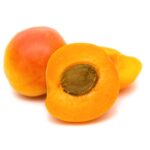 Apricots continue to ripen after picking. They should be stored at room temperature, away from sunlight and heat until they give softly to the touch and have a sweet aroma. Once ripe, refrigerate apricots as necessary to prevent spoiling, but cold temperatures may change their texture and taste.
Apricots continue to ripen after picking. They should be stored at room temperature, away from sunlight and heat until they give softly to the touch and have a sweet aroma. Once ripe, refrigerate apricots as necessary to prevent spoiling, but cold temperatures may change their texture and taste.
Apriums
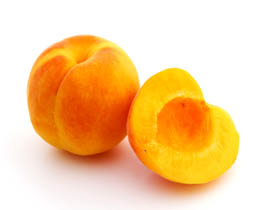 Apriums are an apricot-plum fruit hybrid. They continue to ripen after picking and should be stored at room temperature, away from sunlight and heat until they give softly to the touch and have a sweet aroma. After ripe, refrigerate apriums as necessary to prevent spoiling, but cold temperatures may change their texture and taste.
Apriums are an apricot-plum fruit hybrid. They continue to ripen after picking and should be stored at room temperature, away from sunlight and heat until they give softly to the touch and have a sweet aroma. After ripe, refrigerate apriums as necessary to prevent spoiling, but cold temperatures may change their texture and taste.
Avocados
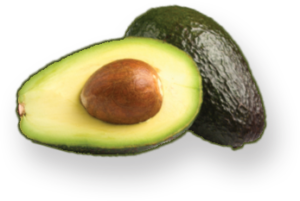 Store avocados at room temperature until they are ripe. They’ll give slightly to pressure when they’re ready to eat. To ripen avocados faster, put them in a paper bag for a couple of days. After ripening, they may be refrigerated for several days, and half-avocados should be stored in an airtight container in the fridge with the pit still in place (to limit browning).
Store avocados at room temperature until they are ripe. They’ll give slightly to pressure when they’re ready to eat. To ripen avocados faster, put them in a paper bag for a couple of days. After ripening, they may be refrigerated for several days, and half-avocados should be stored in an airtight container in the fridge with the pit still in place (to limit browning).
Bananas
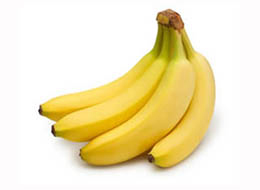 Store bananas at room temperature away from direct sunlight and heat. Bananas become yellow, soft, and sweet as they ripen. If you want to speed the ripening process, put bananas in a paper bag with an apple overnight. The natural ethylene gas released by the apple will help ripen your bananas. Bananas are very delicate and can be easily damaged by extreme temperatures, hot or cold. Refrigerating bananas will turn their skins black. Black-skinned bananas were most likely exposed to extremely cold temperatures. Even refrigerated, the flesh inside will continue to ripen and can still be eaten. Bananas that become too ripe can be peeled, sliced, and frozen for use in smoothies, or used for baking.
Store bananas at room temperature away from direct sunlight and heat. Bananas become yellow, soft, and sweet as they ripen. If you want to speed the ripening process, put bananas in a paper bag with an apple overnight. The natural ethylene gas released by the apple will help ripen your bananas. Bananas are very delicate and can be easily damaged by extreme temperatures, hot or cold. Refrigerating bananas will turn their skins black. Black-skinned bananas were most likely exposed to extremely cold temperatures. Even refrigerated, the flesh inside will continue to ripen and can still be eaten. Bananas that become too ripe can be peeled, sliced, and frozen for use in smoothies, or used for baking.
Berries
 Berries are picked ripe and should be enjoyed as soon as possible. Berries should be kept refrigerated. Remove only what you will eat, wash in cold water, and eat. Do not wash berries until you are ready to eat (or freeze) them.
Berries are picked ripe and should be enjoyed as soon as possible. Berries should be kept refrigerated. Remove only what you will eat, wash in cold water, and eat. Do not wash berries until you are ready to eat (or freeze) them.
Cherries
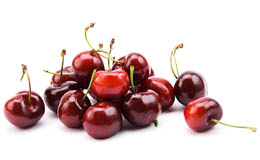 Refrigerate unwashed cherries in a plastic bag for 7-10 days. Before eating, rinse the cherries in cold water and let them warm to room temperature before eating for best flavor. If you think you might not eat them before they spoil, try pitting and freezing the cherries for a refreshing treat in the hot summer months!
Refrigerate unwashed cherries in a plastic bag for 7-10 days. Before eating, rinse the cherries in cold water and let them warm to room temperature before eating for best flavor. If you think you might not eat them before they spoil, try pitting and freezing the cherries for a refreshing treat in the hot summer months!
Figs
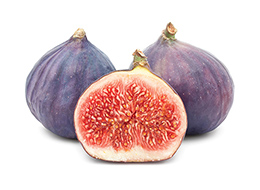 Figs are picked ripe. If they are hard, let them sit a room temperature until soft. Once ripe, refrigerate figs until ready to eat. Wash before eating and enjoy them cold, or at room temperature. Figs can be peeled or eaten with the skins according to taste.
Figs are picked ripe. If they are hard, let them sit a room temperature until soft. Once ripe, refrigerate figs until ready to eat. Wash before eating and enjoy them cold, or at room temperature. Figs can be peeled or eaten with the skins according to taste.
Grapefruit
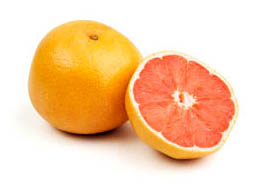 Grapefruit can be stored at room temperature for a week or so. Keep out of direct sunlight. You can also refrigerate grapefruit for up to several weeks.
Grapefruit can be stored at room temperature for a week or so. Keep out of direct sunlight. You can also refrigerate grapefruit for up to several weeks.
Grapes
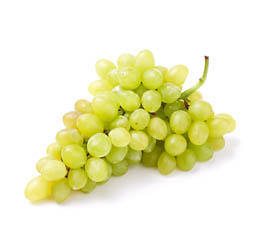 Grapes should be stored in the refrigerator, unwashed and dry, and kept on their stems (rather than loose). Wash them in cold water just before eating. If you rinse grapes before putting them in the fridge, they’ll only last a few days—since even a tiny amount of moisture will encourage bacteria growth, as will the exposed area left behind by the stem. Dry, refrigerated grapes on the stem can last up to two weeks. You can also freeze washed single grapes and eat them like little popsicle treats.
Grapes should be stored in the refrigerator, unwashed and dry, and kept on their stems (rather than loose). Wash them in cold water just before eating. If you rinse grapes before putting them in the fridge, they’ll only last a few days—since even a tiny amount of moisture will encourage bacteria growth, as will the exposed area left behind by the stem. Dry, refrigerated grapes on the stem can last up to two weeks. You can also freeze washed single grapes and eat them like little popsicle treats.
Kiwi
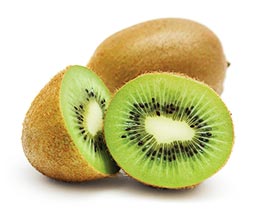 Keep kiwifruit at room temperature until ripe, when it gives slightly to the touch. Once ripe, refrigerated kiwi will keep for a few days. Very firm unripe kiwi can keep refrigerated for up to two months. Wash your kiwi and eat with the skin or cut in half and scoop it out with a spoon.
Keep kiwifruit at room temperature until ripe, when it gives slightly to the touch. Once ripe, refrigerated kiwi will keep for a few days. Very firm unripe kiwi can keep refrigerated for up to two months. Wash your kiwi and eat with the skin or cut in half and scoop it out with a spoon.
Lemons
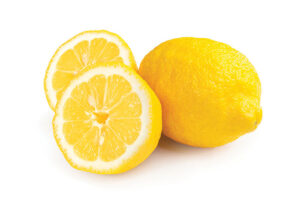 Lemons can be stored at room temperature for up to 14 days. Keep out of direct sunlight. Refrigerated lemons can keep up to several weeks.
Lemons can be stored at room temperature for up to 14 days. Keep out of direct sunlight. Refrigerated lemons can keep up to several weeks.
Limes
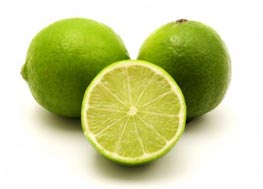 Limes can be stored at room temperature for a couple of weeks, out of direct sunlight. Refrigerated lines can keep for up to several weeks.
Limes can be stored at room temperature for a couple of weeks, out of direct sunlight. Refrigerated lines can keep for up to several weeks.
Mangoes
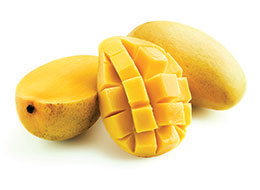 Mangoes can be stored at room temperature and will continue to ripen. When they give slightly to touch, they are ready to eat. Refrigerate mangoes to slow down the ripening process.
Mangoes can be stored at room temperature and will continue to ripen. When they give slightly to touch, they are ready to eat. Refrigerate mangoes to slow down the ripening process.
Melons
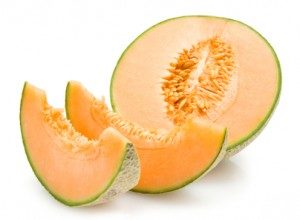 Store melons at room temperature until ripe. The best indicator of melon ripeness is the aroma. If a melon’s sweet fragrance is noticeable, it’s probably ready to cut and eat. The outside of the melon should feel firm but give slightly to pressure, particularly on the end where the stem was. If it feels rock-hard, give it a little more time. Wash thoroughly before cutting. Once cut, remove seeds by scooping them out with a spoon, cover and refrigerate.
Store melons at room temperature until ripe. The best indicator of melon ripeness is the aroma. If a melon’s sweet fragrance is noticeable, it’s probably ready to cut and eat. The outside of the melon should feel firm but give slightly to pressure, particularly on the end where the stem was. If it feels rock-hard, give it a little more time. Wash thoroughly before cutting. Once cut, remove seeds by scooping them out with a spoon, cover and refrigerate.
Nectarines
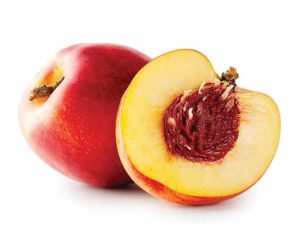 Nectarines are climacteric, which means they ripen after picking. Nectarines should be stored at room temperature, away from sunlight and heat until they give softly to touch and have a sweet aroma. The FruitGuys strives to deliver them to you on the firm side so they won’t be damaged in shipping. To speed nectarine ripening, place them in a paper bag on the counter. When they’ve reached the desired ripeness, wash and eat. You can also refrigerate ripe nectarines for up to several days.
Nectarines are climacteric, which means they ripen after picking. Nectarines should be stored at room temperature, away from sunlight and heat until they give softly to touch and have a sweet aroma. The FruitGuys strives to deliver them to you on the firm side so they won’t be damaged in shipping. To speed nectarine ripening, place them in a paper bag on the counter. When they’ve reached the desired ripeness, wash and eat. You can also refrigerate ripe nectarines for up to several days.
Oranges
 Oranges can be stored at room temperature for a couple of weeks or refrigerated for up to several weeks. Keep out of direct sunlight. Wash and slice, peel and eat, or juice and drink.
Oranges can be stored at room temperature for a couple of weeks or refrigerated for up to several weeks. Keep out of direct sunlight. Wash and slice, peel and eat, or juice and drink.
Passion Fruit
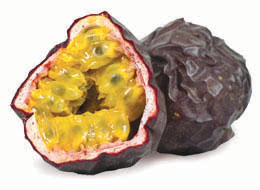 Passion fruit is a fragrant fruit and is best eaten ripe, cut in half and scooped out. You can tell when a passion fruit is ripe when it begins to look shriveled. For the best tasting passion fruit, we recommend you store passion fruit on the counter out of direct sunlight and give it a few days to “wrinkle-up.”
Passion fruit is a fragrant fruit and is best eaten ripe, cut in half and scooped out. You can tell when a passion fruit is ripe when it begins to look shriveled. For the best tasting passion fruit, we recommend you store passion fruit on the counter out of direct sunlight and give it a few days to “wrinkle-up.”
Peaches
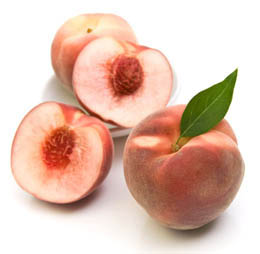 Peaches are climacteric, which means they ripen after picking. Peaches should be stored at room temperature, away from sunlight and heat until they give softly to the touch and have a sweet aroma. The FruitGuys delivers them to you on the firm side so they won’t be damaged during shipping. Peach ripening can be hastened by placing them in a paper bag on the counter. When they’ve reached the desired ripeness, you can refrigerate peaches, but cold temperatures may change their texture and taste.
Peaches are climacteric, which means they ripen after picking. Peaches should be stored at room temperature, away from sunlight and heat until they give softly to the touch and have a sweet aroma. The FruitGuys delivers them to you on the firm side so they won’t be damaged during shipping. Peach ripening can be hastened by placing them in a paper bag on the counter. When they’ve reached the desired ripeness, you can refrigerate peaches, but cold temperatures may change their texture and taste.
Pears
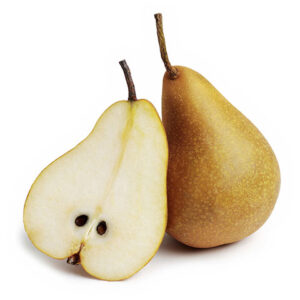 Pears are picked hard and continue to ripen. Pears should be stored at room temperature, away from heat and sunlight. Pears ripen from the inside out, so if it gives to the touch, particularly near the stem, it is ready to eat. You can slow ripening by refrigerating pears. Once ripe, the pear can be refrigerated for up to five days.
Pears are picked hard and continue to ripen. Pears should be stored at room temperature, away from heat and sunlight. Pears ripen from the inside out, so if it gives to the touch, particularly near the stem, it is ready to eat. You can slow ripening by refrigerating pears. Once ripe, the pear can be refrigerated for up to five days.
Plums
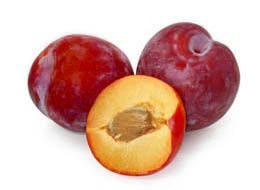 Plums continue to ripen after picking. Plums should be stored at room temperature, away from sunlight and heat until they give softly to the touch and have a sweet aroma. Once ripe, refrigerate plums as necessary to prevent spoiling, but cold temperatures may change their texture and taste.
Plums continue to ripen after picking. Plums should be stored at room temperature, away from sunlight and heat until they give softly to the touch and have a sweet aroma. Once ripe, refrigerate plums as necessary to prevent spoiling, but cold temperatures may change their texture and taste.
Pluots
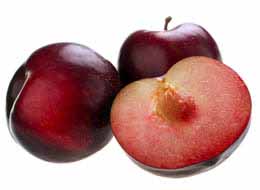 Pluots are a plum-apricot cross. They continue to ripen after picking and should be stored at room temperature, away from sunlight and heat until they give softly to the touch and have a sweet aroma. Once ripe, refrigerate pluots as necessary to prevent spoiling, but cold temperatures may change their texture and taste.
Pluots are a plum-apricot cross. They continue to ripen after picking and should be stored at room temperature, away from sunlight and heat until they give softly to the touch and have a sweet aroma. Once ripe, refrigerate pluots as necessary to prevent spoiling, but cold temperatures may change their texture and taste.
Pomelos
 Pomelos are the largest citrus fruit. Pomelos can be stored at room temperature for a couple of weeks or refrigerated for up to several weeks. Keep away from direct sunlight and heat.
Pomelos are the largest citrus fruit. Pomelos can be stored at room temperature for a couple of weeks or refrigerated for up to several weeks. Keep away from direct sunlight and heat.
Satsuma Mandarin
 Satsumas can be stored at room temperature for a couple of weeks or refrigerate Satsumas for up to several weeks. Satsuma mandarin skin is soft, pliable, and has an “airy” and puffy look and feel. Don’t let the looks of the peel fool you—this is a deliciously sweet-tart mandarin, one of our favorites.
Satsumas can be stored at room temperature for a couple of weeks or refrigerate Satsumas for up to several weeks. Satsuma mandarin skin is soft, pliable, and has an “airy” and puffy look and feel. Don’t let the looks of the peel fool you—this is a deliciously sweet-tart mandarin, one of our favorites.
Tangerines
 Tangerines can be stored at room temperature for a couple of weeks or refrigerated for up to several weeks. Keep away from direct sunlight and heat.
Tangerines can be stored at room temperature for a couple of weeks or refrigerated for up to several weeks. Keep away from direct sunlight and heat.
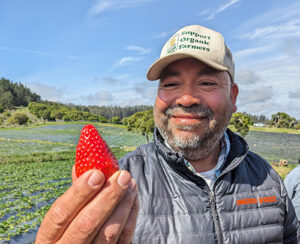
Farmer of the Month: Javier Zamora of JSM Organics
Stepping out of the car and onto the soil of JSM Organics in Royal Oaks, California, felt like setting foot in an orderly kind of
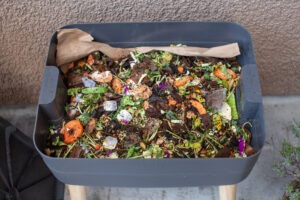
Office Composting 101: How to Start Composting at Work
If you’re worried about the food waste piling up in trash cans at your office, composting at work might be the perfect solution. Composting is

How to Plan an Office Snack Tasting or Fruit Tasting Like a Pro
Hosting group events like lunch-and-learns and holiday celebrations in the office is a great way to boost employee happiness, teach your team something new, and
GoodWorks Together
Buying your fruit from The FruitGuys sustains the small independent farmers we support and source from and the hunger relief organizations we donate to through our GoodWorks programs.
We donate a minimum value of 20% annual profits through weekly produce donations and through annual environmental stewardship grants to small farms via our non-profit, The FruitGuys Community Fund.
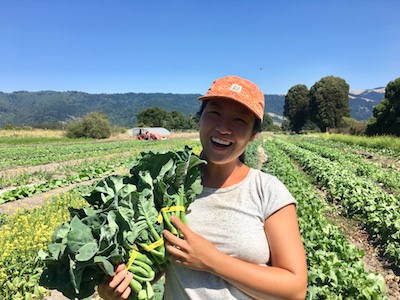
Supporting Small Farms
The FruitGuys Community Fund has provided 123 grants to small farms in 32+ states for environmental sustainability projects since 2012. Nearly 90% are farms with women or BIPOC leadership.

Fighting Hunger
We donate all visually-imperfect and excess produce and snacks to hunger relief community partners nationwide. Instead of cancelling your delivery, you can forward your order through our Donate-a-Crate program.
About The FruitGuys
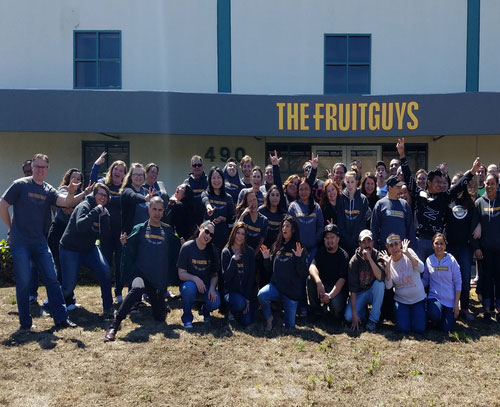
Family-Owned B Corp
Since 1998, The FruitGuys has been on a mission to support sustainable agriculture and combat hunger. Every purchase supports people and the planet through our GoodWorks programs.
We donate a minimum value of 20% of our annual profits.
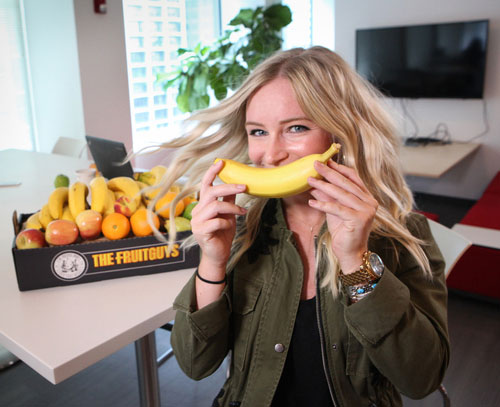
Our 100% Satisfaction Guarantee
We want you to be delighted with our offerings and service. If you’re not satisfied for any reason, we’ll make it right with a replacement or credit. No hassles.

Our 5Rs Promise
- We’ll be Respectful of you at all times.
- We’ll be Responsive to your needs.
- We’ll be Realistic about what we can or cannot do.
- We’ll take personal Responsibility to provide a positive experience.
- We’ll work hard so that you Remember us positively.





